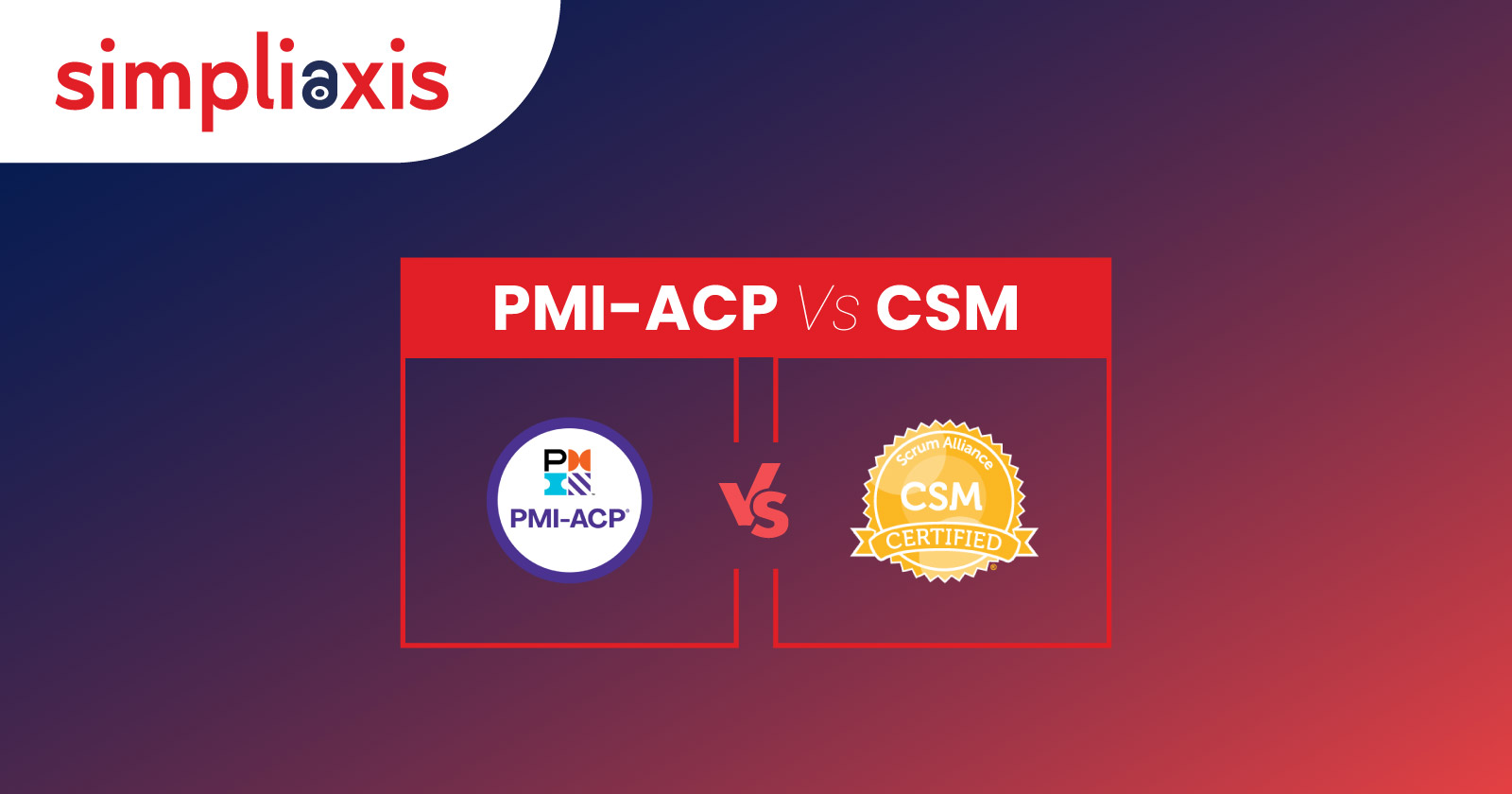In today's competitive world, professionals must constantly learn and enhance their knowledge. Project Management certifications, such as Agile Certified Practitioner (ACP) from Project Management Institute (PMI) and Certified Scrum Master (CSM) from Scrum Alliance, are not just badges of honor, but also gateways to higher earning potential and career stability. Acquiring a PMI-ACP® or CSM® certification can significantly enhance your work portfolio and open up new career prospects.
Choosing the proper certification based on industry requirements can give you a competitive edge in your job role. This blog provides a comprehensive comparison of PMI-ACP® and CSM® certifications, highlighting their unique features and benefits. Understanding these differences will empower you to make an informed decision about which certification is the best fit for your career growth.
What is PMI-ACP® Certification?
PMI Agile Certified Practitioner® (PMI-ACP®) certification is a popular choice among project management professionals and is an outstanding achievement. It focuses on using Agile methodologies.
These certifications are not just about theory. They demonstrate that you have the experience and skill set required to apply your knowledge in real-world scenarios. This practical application sets you apart in the job market and gives you the confidence to take on new challenges.
Explore: PMI-ACP® Certification Training
What is CSM® Certification?
Certified Scrum Master® (CSM®) Certification includes the Scrum approach. This is one of the most widely used methodologies, and CSM is considered the first step to improving your Agile knowledge. It helps professionals understand the fundamental terminologies, practices, and principles.
The CSM® Certification will help to prove your competence in Scrum. Scrum adoption is growing rapidly, and adding this qualification to your career can give you a distinct advantage.
Also, check:CSM® Certification Training
Difference Between PMI-ACP and CSM
PMI-ACP and CSM credentials will help professionals improve their ScrumScrum and project management skills. However, both have specific differences regarding Agile methodologies, exam formats, career opportunities, etc.
A few of the differences between PMI-ACP and CSM are explained below.
Market Demand
The market demand for both certifications is strong, and both are important in their respective industries. CSM is considered an entry-level certification for Agile and Scrum environments, whereas PMI-ACP is considered a high-level certification.
Organizational View
Certified Scrum Master® (CSM®) Certification primarily focuses on Scrum, its techniques, principles, and tools, and organizations mainly apply Scrum to their Agile practices. PMI-ACP is a well-renowned certification for project management and is accepted by organizations that value using Agile approaches to project management.
Career Prospect
Both of these certifications are helpful for professionals to advance their careers. An individual who has a keen interest in working in Agile Project Management, Agile coaching, or Agile consulting must pursue PMI-ACP.
CSM will benefit people who want to work with Scrum methodologies applicable in Agile environments. This certification offers an in-depth understanding of Scrum. Professionals interested in working as a Scrum Master or Agile team member can choose this CSM.
Eligibility Criteria
Prerequisites for PMI-ACP® Certification. These criteria are mandatory to be met:
- Secondary degree
- Twenty-one contact hours of agile practice training
- Twelve months of general project experience within the last five years (a current PMP® or PgMP® can satisfy this requirement)
- Eight months of agile project experience within the last three years
Prerequisites for CSM® Certification:
There are no hard and fast rules or prerequisites for Scrum Master® (CSM®) certification. But, having basic knowledge in a few areas can be helpful.
- A basic understanding of Agile concepts, tools, methodologies, and principles can help you
- Prior knowledge of Scrum and its principles, roles, and responsibilities is beneficial
- Previous experience in software development or project management can help you understand how Scrum work
- There are no specific education criteria for availing of the CSM course
None of the above-mentioned criteria for a CSM course is mandatory, but having basic knowledge of these can help you understand the certification much better.
Exam Format
Below the table, we help you understand the certifications' basic exam format.
Pattern | PMI-ACP | CSM |
Number of Questions | 120 (20 are pre-test questions that are not scored) | 50 questions |
Type of questions | Multiple-choice questions | Multiple-choice questions |
Exam duration | 3 hours | 1 hour |
Passing score | 70% | 74% |
Cost Range | USD 949-1589 | USD 345-745 |
This information will help the professionals understand the certification difficulty level and will help you prepare more efficiently for the examination.
Final Thoughts
Hopefully this information would have helped you understand the difference between PMI-ACP® and CSM® certifications. The professionals can definitely choose the certification as per their career preference and interest. This blog would have given you an idea about both certification’s credibility and will boost your career. Choose wisely as per your career needs.













 +1-361-998-9988
+1-361-998-9988


